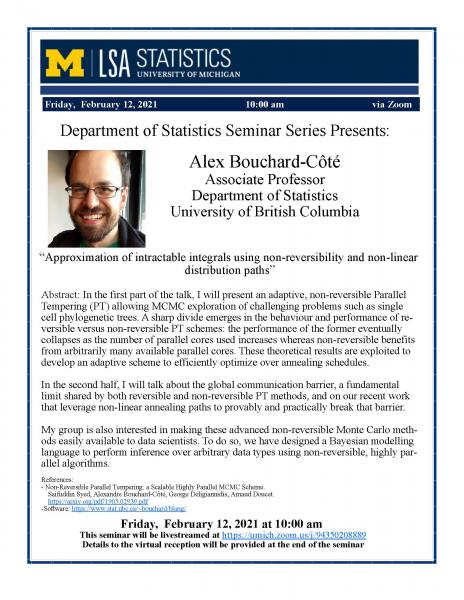Statistics Department Seminar Series: Alex Bouchard-Côté, Associate Professor, Department of Statistics, University of British Columbia
"Approximation of intractable integrals using non-reversibility and non-linear distribution paths"

Friday, February 12, 2021
10:00-11:00 AM
Virtual
Abstract: In the first part of the talk, I will present an adaptive, non-reversible Parallel Tempering (PT) allowing MCMC exploration of challenging problems such as single cell phylogenetic trees. A sharp divide emerges in the behaviour and performance of reversible versus non-reversible PT schemes: the performance of the former eventually collapses as the number of parallel cores used increases whereas non-reversible benefits from arbitrarily many available parallel cores. These theoretical results are exploited to develop an adaptive scheme to efficiently optimize over annealing schedules.
In the second half, I will talk about the global communication barrier, a fundamental limit shared by both reversible and non-reversible PT methods, and on our recent work that leverage non-linear annealing paths to provably and practically break that barrier.
My group is also interested in making these advanced non-reversible Monte Carlo methods easily available to data scientists. To do so, we have designed a Bayesian modelling language to perform inference over arbitrary data types using non-reversible, highly parallel algorithms.
References:
- Non-Reversible Parallel Tempering: a Scalable Highly Parallel MCMC Scheme.
Saifuddin Syed, Alexandre Bouchard-Côté, George Deligiannidis, Arnaud Doucet.
https://arxiv.org/pdf/1905.02939.pdf
- Software: https://www.stat.ubc.ca/~bouchard/blang/
https://www.stat.ubc.ca/~bouchard/
This seminar will be livestreamed via Zoom https://umich.zoom.us/j/94350208889
There will be a virtual reception to follow
In the second half, I will talk about the global communication barrier, a fundamental limit shared by both reversible and non-reversible PT methods, and on our recent work that leverage non-linear annealing paths to provably and practically break that barrier.
My group is also interested in making these advanced non-reversible Monte Carlo methods easily available to data scientists. To do so, we have designed a Bayesian modelling language to perform inference over arbitrary data types using non-reversible, highly parallel algorithms.
References:
- Non-Reversible Parallel Tempering: a Scalable Highly Parallel MCMC Scheme.
Saifuddin Syed, Alexandre Bouchard-Côté, George Deligiannidis, Arnaud Doucet.
https://arxiv.org/pdf/1905.02939.pdf
- Software: https://www.stat.ubc.ca/~bouchard/blang/
https://www.stat.ubc.ca/~bouchard/
This seminar will be livestreamed via Zoom https://umich.zoom.us/j/94350208889
There will be a virtual reception to follow
| Building: | Off Campus Location |
|---|---|
| Location: | Virtual |
| Event Link: | |
| Website: | |
| Event Type: | Workshop / Seminar |
| Tags: | seminar |
| Source: | Happening @ Michigan from Department of Statistics, Department of Statistics Seminar Series |

